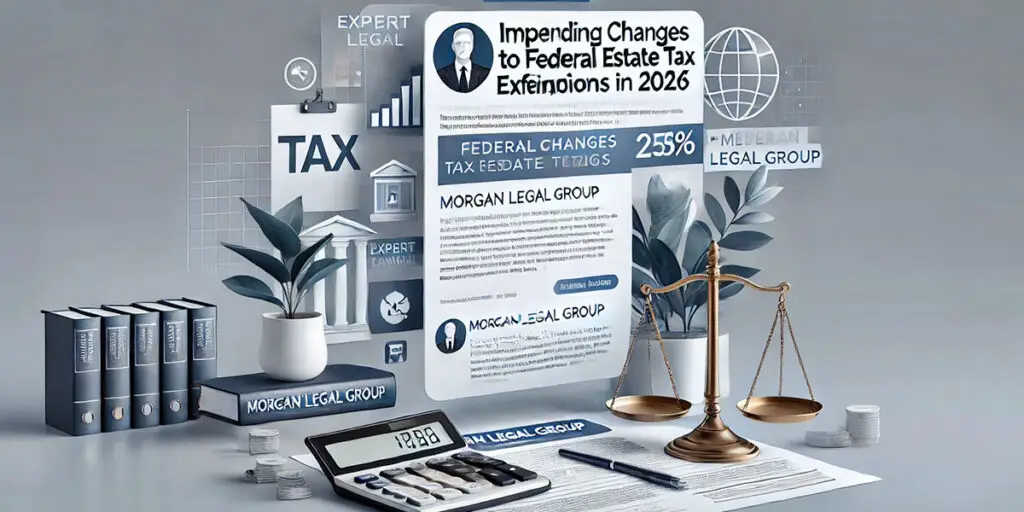Impending Changes to Federal Estate Tax Exemptions in 2026: A Guide for New York Residents
As we move closer to 2026, New York residents need to understand the significant changes that are on the horizon regarding federal estate tax exemptions. Specifically, the scheduled reduction of the federal estate tax exemption from approximately $14 million to $7 million per individual at the end of 2025 will have a direct impact on many families in New York. Therefore, this article provides a detailed analysis of these impending changes while emphasizing the importance of proactive estate planning to maximize current exemptions and protect your financial future. Indeed, failing to plan for these changes can cause serious and unnecessary tax liabilities for your family.
Understanding Federal Estate Tax Exemptions
Before discussing the impending reduction, it is important to define what a federal estate tax exemption is clearly. The federal estate tax is a tax imposed on transferring your assets to your heirs upon your death. Specifically, the exemption amount represents the value of assets that are exempt from this tax and thus can pass to your beneficiaries free from federal estate taxes. Therefore, understanding the exemption rules is an important part of overall financial and estate planning.
- Tax-Free Transfer: Notably, assets below the exemption level can be transferred tax-free to your beneficiaries.
- Exemption Amounts: Additionally, the exemption is subject to adjustment based on both inflation, and changes in the law.
- Taxable Value: Furthermore, assets that exceed the current exemption level may be subject to the federal estate tax.
The Current Exemption of Approximately $14 Million
Under current law, which is set to expire at the end of 2025, the federal estate tax exemption is approximately $14 million per individual, and this was temporarily doubled by the Tax Cuts and Jobs Act of 2017. Specifically, this significant exemption has greatly benefited many estates, allowing many families to pass their assets on, with minimal tax liabilities. However, it is vital to understand that this provision is set to expire, and the estate tax exemption will be reduced. Thus, it’s important to understand the change that is coming, and to plan accordingly.
- Temporary Increase: For example, the $14 million exemption is only temporary and will expire at the end of 2025.
- Tax Cuts and Jobs Act of 2017: This law also temporarily increased the exemption level.
- Sunset Provision: Furthermore, at the end of 2025, this law is scheduled to expire, bringing the exemption level down considerably.
The Scheduled Reduction to Approximately $7 Million in 2026
At the end of 2025, the federal estate tax exemption is set to be reduced, going back to the levels that were in place before the Tax Cuts and Jobs Act, and adjusting for inflation. Specifically, the exemption is set to drop from approximately $14 million, down to approximately $7 million per individual, for tax year 2026. Therefore, this will have a significant impact on many estates, and will cause an increase in the number of estates that will become subject to estate taxes, and it will also be important to evaluate your plan, in light of these changes:
- Significant Reduction: Notably, the federal exemption will drop by around half.
- More Taxable Estates: Additionally, this will lead to more estates becoming subject to the estate tax.
- Proactive Planning: Moreover, proper planning must be implemented to take advantage of the currently high exemption, and to minimize the impact of this coming change.
Who Will be Affected by the Reduced Exemption?
The impending reduction in the federal estate tax exemption will impact individuals with estates that are valued above the new threshold, and these individuals must plan proactively to address this challenge, and to avoid unnecessary tax liabilities. Specifically, those who have estates valued above approximately $7 million, or $14 million for a married couple will now face a potentially greater estate tax liability after the year 2025. Therefore, it’s vital to be aware of how this change might impact your plan, if you are in that category.
- High-Value Estates: Firstly, those who have estates valued at over approximately $7 million, will be subject to the federal estate tax.
- Business Owners: Secondly, business owners who have high value businesses should also plan for these coming changes.
- Real Estate Holdings: Thirdly, individuals with significant real estate holdings will also want to proactively plan for these potential increases in estate taxes.
- Significant Investments: Finally, individuals who have substantial investment portfolios also must plan for these upcoming changes to the law.
The Importance of Proactive Estate Planning
Given these impending changes, proactive estate planning becomes more critical than ever for all New York residents. Specifically, by acting now you can implement strategies to minimize the impact of a lower exemption, while also ensuring that your family’s financial needs will be met. Therefore, now is the time to act, and implement your strategy for your estate.
- Maximize Current Exemptions: Notably, acting now lets you utilize the current higher exemption levels.
- Minimize Tax Liabilities: Additionally, strategic planning will help you lower any potential tax burden on your estate.
- Secure Your Legacy: Finally, proactively planning ensures that your assets will be passed on to your beneficiaries as intended, and will minimize any unforeseen consequences.
Strategies to Maximize Current Exemptions Before 2026
Before the federal estate tax exemption decreases at the end of 2025, there are several strategies that New York residents can utilize, to make the most of the current, higher exemption levels. Specifically, these methods include gifting, and setting up certain kinds of trusts, such as irrevocable trusts. Therefore, explore the following options, and see how they can be used in your plan, with the guidance of your legal advisors:
- Annual Gifting: Firstly, use the annual gift tax exclusion to gift assets up to the limit each year to your beneficiaries.
- Lifetime Gifting: Additionally, make use of the lifetime gift tax exclusion to gift larger amounts of assets, if necessary.
- Irrevocable Trusts: Furthermore, establish irrevocable trusts to remove assets from your taxable estate, while still maintaining control and meeting all of your goals.
Gifting Strategies to Reduce Your Taxable Estate
Strategic gifting can be a powerful tool to reduce the value of your estate, and to minimize your overall tax burden. Specifically, under current law, the federal government allows you to gift assets to individuals up to a specific annual limit, each year, without tax liabilities. Therefore, it is a powerful tool that should be utilized as part of a comprehensive plan, before the changes take effect:
- Annual Gift Exclusion: Firstly, gift assets up to the annual exclusion limit each year, to as many beneficiaries as you like.
- Lifetime Gift Exemption: Secondly, utilize the lifetime gift exemption if you need to gift assets above the annual limit.
- Strategic Timing: Thirdly, plan to make gifts before the end of 2025 to benefit from the currently higher exemption level.
Irrevocable Trusts for Asset Protection and Tax Planning
Irrevocable trusts are another important tool that can assist with both asset protection, and tax minimization. Specifically, when assets are transferred to an irrevocable trust, they are no longer considered part of your taxable estate, offering protection from both estate taxes and also creditor claims. Therefore, setting up an irrevocable trust can be extremely useful in the long term, in order to help you reach all of your financial and estate planning goals.
- Estate Tax Reduction: Primarily, assets held in an irrevocable trust are typically not counted as part of your taxable estate, and are not subject to tax.
- Asset Protection: Additionally, these types of trusts provide protection from creditors, and other claims against your estate.
- Beneficiary Control: Moreover, while the trust is irrevocable, you can set up rules for the management of the assets, and how they will be transferred to your beneficiaries, according to your wishes.
Life Insurance Strategies for Estate Tax Planning
Life insurance can also play a critical role in estate planning, and can provide liquidity to cover potential estate taxes or to provide a financial legacy for your loved ones. Specifically, life insurance can be placed into an Irrevocable Life Insurance Trust (ILIT), which then removes the insurance funds from your taxable estate. Therefore, utilizing life insurance strategies such as these can allow you to both protect your family financially, and to minimize your estate’s tax burden, for the future:
- Irrevocable Life Insurance Trusts (ILITs): Firstly, use an ILIT to hold your life insurance policies, so they are not included in your taxable estate.
- Liquidity to Pay Taxes: Secondly, make sure you have a way to provide enough liquid assets to pay estate taxes.
- Beneficiary Protection: Thirdly, consider life insurance as a tool to provide financial security for your loved ones after your death.
The Impact on New York State Estate Taxes
While the federal estate tax is often at the forefront of planning conversations, it’s also crucial to understand how the scheduled federal changes might impact your New York State estate taxes. Specifically, New York has its own state estate tax laws, with unique exemptions and calculations that are separate from federal regulations, which all must be considered. Therefore, it’s essential to plan for both federal and New York State tax implications for your estate:
- New York Tax Laws: To start, New York has its own specific state estate tax rules, separate from federal laws, and these rules are frequently changed.
- Coordination with Federal Law: Additionally, the relationship between federal law and New York law should also be considered, while planning your strategy.
- State Estate Tax “Cliff”: Finally, be sure to plan to remain below the state’s “cliff”, where the full estate value is taxed.
Working with Morgan Legal Group: Expert Guidance for 2026
Navigating the complexities of estate planning, and the changing tax environment in 2026, requires expert legal guidance and counsel. Specifically, the team at Morgan Legal Group is well-versed in both federal and New York State tax laws, and we are dedicated to helping you protect your assets and plan for your future. Therefore, by choosing our firm, you can expect:
- Deep Legal Knowledge: Firstly, our attorneys possess a thorough understanding of both federal and New York State tax laws.
- Personalized Planning: Secondly, we work with you to develop a customized plan that is specific to your individual needs and goals.
- Proactive Strategies: Thirdly, we implement forward thinking strategies to minimize tax liabilities, while remaining in compliance with all rules.
- Compassionate Service: Finally, we provide sensitive and compassionate guidance through all of the legal processes and planning decisions.
Common Estate Planning Mistakes to Avoid
When planning for changes to the law, there are a number of common mistakes that people make that can derail even the most well-intentioned plans. Specifically, common errors include waiting until the last minute to plan, using incomplete documents, or not addressing all aspects of your specific situation. Therefore, to best meet your goals, and to stay in compliance with all state and federal rules, avoid these common errors:
- Procrastination: Firstly, waiting to act until after the laws have already changed can severely limit your options.
- Incomplete Planning: Secondly, creating an incomplete legal plan may leave gaps in your protection.
- Ignoring Professional Advice: Thirdly, not seeking expert legal and financial advice when making complex decisions.
- Failing to Update: Lastly, not regularly reviewing and updating your estate plan over time.
The Urgency of Planning: Take Action Now
Given the scheduled changes to the federal estate tax exemptions in 2026, the need for action is clear. Specifically, waiting until the last minute limits your options, and may cause you to miss opportunities to make the most of the currently higher exemption. Therefore, now is the time to contact Morgan Legal Group and to begin this process, with expert legal guidance and support.
- Schedule a Consultation: First, reach out to Morgan Legal Group to discuss your specific estate planning goals and concerns.
- Review Your Assets: Second, carefully review all of your assets, and seek professional advice for accurate valuations.
- Implement Strategies: Finally, take steps to implement any tax minimization and estate protection strategies, as soon as possible.
For more information on federal estate tax laws you can also consult the website of the Internal Revenue Service: www.irs.gov.
Conclusion: Secure Your Legacy with Expert Estate Planning
In conclusion, the impending changes to federal estate tax exemptions in 2026 present significant challenges for New York residents. Specifically, however, by implementing proactive strategies, such as gifting, setting up trusts, and utilizing life insurance, you can maximize the current exemption levels, and protect your assets for future generations. Therefore, working with the experienced estate planning attorneys at Morgan Legal Group, you will be able to navigate all of these complex issues, and to create a plan that will protect your legacy, and fulfill all of your long term goals. Thus, do not wait any longer to protect what is most important to you, contact us today to get started on your estate planning journey.







